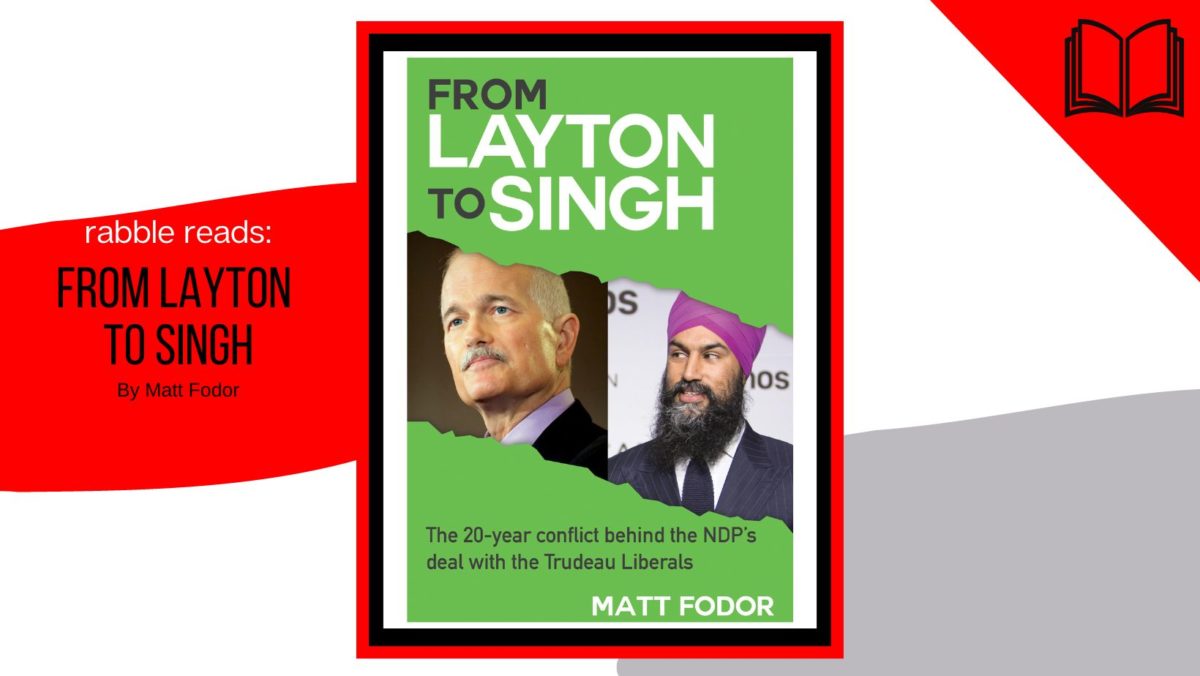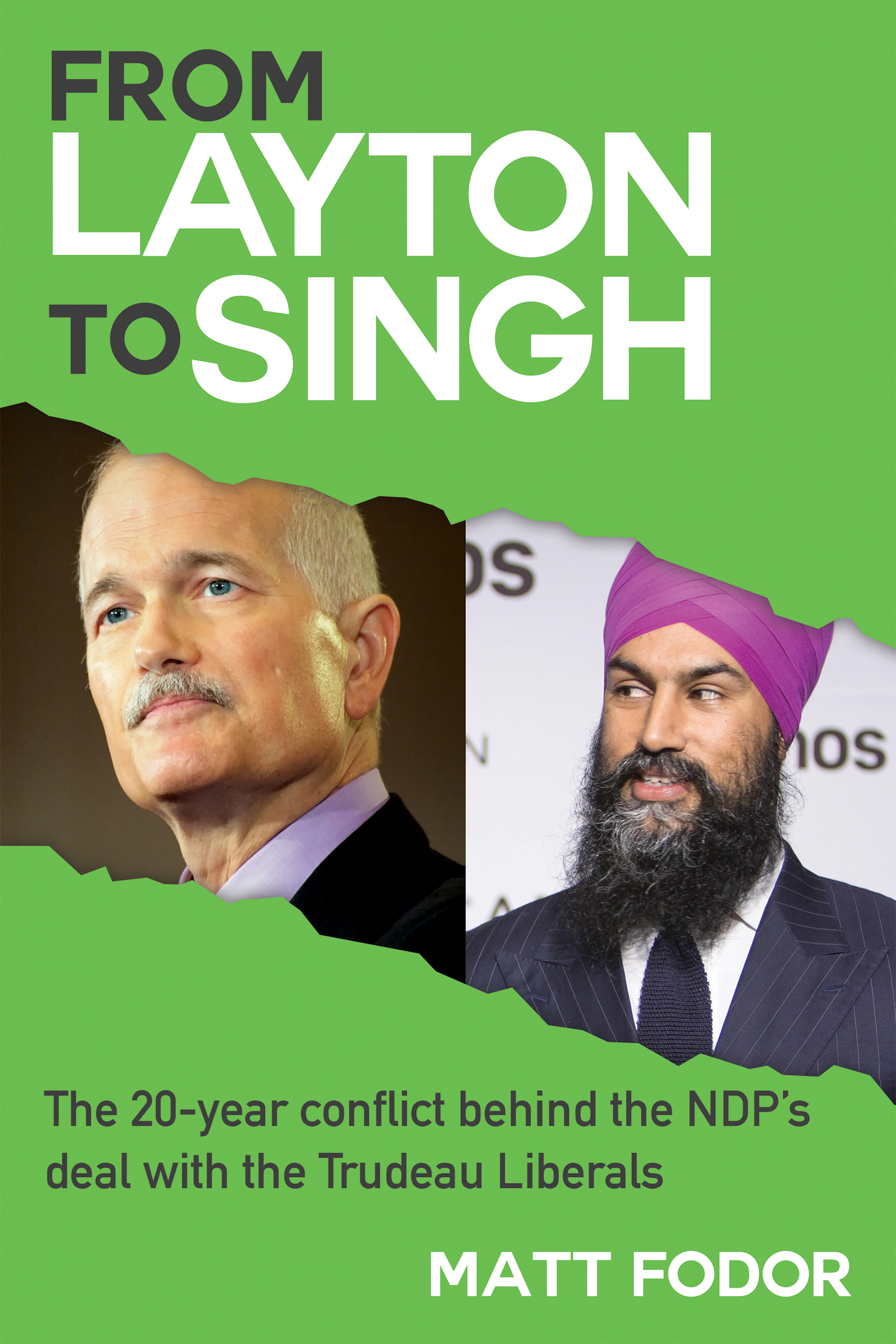Jagmeet Singh in a surprise move emailed a public letter that placed the treatment of Palestinians in Israel and the occupied territories at the level of an international crisis. It is the clearest statement on this issue from the federal NDP.
There is no chance that the minority Liberals government governing with the support of the NDP in Parliament will bend to any concerns about Israeli impunity.
And while I don’t have an insight into how the NDP leader made his decision it can be credited to the grassroots lobbying within the party membership and activist groups at large such as Independent Jewish Voices (IJV) (full disclosure, I am a member of IJV).
Does this signify a switch from top-down decision making on policy that expanded when Jack Layton served as NDP leader from 2003 to 2011?Time will tell. Writer, political strategist and PhD candidate in political science at York University, Matt Fodor delves into the weeds of leadership philosophy and styles in a new book, From Layton to Singh: The 20-year Struggle for the NDP’s Soul.
Layton emerged as an innovative and inspiring city councillor on the Toronto municipal scene. (As a writer for various local alt. weeklies I knew the man personally). At the NDP leadership convention in 2003, he won on the first ballot. Support came from across the spectrum. They included members of the party left, Libby Davies and Svend Robinson, as well as former leader Ed Broadbent, former Ontario NDP party president Janet Solberg and the United Steelworkers.
Layton’s decision to professionalize and expand the federal party bureaucracy in Ottawa with strategists and communications specialists (doing continuous polling and focus groups) made sense in the competitive partisan context. By 2015 the NDP party headquarters on Laurier Ave. employed 250 people on staff, a jump from 40 one year earlier.
The problem, says Fodor, is that the federal NDP became more highly centralized around the leader and the party operatives, the latter working on devising the political messaging and policy.
It was already the case that the primary function of the membership in the federal NDP riding associations was not to discuss policy at the grassroots or educate members on policy, but primarily to raise money and volunteers for political campaigns at election time.
Layton became the leader of the federal NDP in 2003 at a propitious time when Paul Martin, the business friendly and right leaning Liberal prime minster was heading the country and there was a perceived opening on the centre left.
As finance minister in the previous Jean Chretien Liberal government Martin gained high marks among elite circles for eviscerating the Canadian welfare state in areas like housing and unemployment insurance, the consequences of which we are experiencing today in 2022 in a more unequal Canada.
Fodor says the federal NDP, which had never held power was positioned within the party as a social democratic oasis true to its roots. This was in contrast to the provincial NDP counterparts governing Ontario, Saskatchewan, Nova Scotia and Manitoba starting in the 1990s which emphasized market friendly Third Way policies.
Layton led the NDP through four federal elections, relying on advisors from the provincial wings.
In the high mark 2011 election Jack Layton sought to remove the so-called political stigma of a tax and spend party. No mention was made in the platform for new social programs. Indeed, the focus was on rewarding job creators through tax cuts for small business, the maintenance of Canadian corporate rates as “competitive,” and a more modest childcare plan (25,000 spaces annually) than what had been advocated in previous NDP platforms. There was also no call for pharmacare, criticism of international trade agreements was muted and unions were noticeably absent from the platform.
“Altogether, the NDP increasingly accepted the parameters of neoliberal capitalism,” writes Matt Fodor.
A rearrangement in national partisan fortunes seemed to be in the cards as the federal Liberals were mired in third place in the House of Commons under weak leadership following the 2011 election when Stephen Harper and the Conservatives were ushered in with their first majority government.
In the same election, the NDP had surged to second place under Layton after gaining seats in his native Quebec at the expense of the Bloc Quebecois which looked tired and a spent force (temporarily it turned out). The NDP had successfully pitched itself as a social democratic party in line with Quebec values.
Things still looked promising even after Layton’s untimely death from cancer following the 2011 election. His number one recruit in Quebec Tom Mulcair took charge of the federal NDP during a contentious 2012 leadership convention where he won after four ballots (his major opponent was Layton policy strategist Brian Topp.)
Previously a minister in the Quebec Liberal provincial government Mulcair had primarily left that allegiance because of differences over environmental policy, not as a dissident on the left.
Mulcair fitted well into a reconfigured neo-liberal federal party in the 2000s under Jack Layton who supported a balanced budget.
You know what happened next. Justin Trudeau and the Liberals came sailing into power after languishing in third place in the previous Parliament by running to the left of the Mulcair led NDP in support of increased government spending. The Conservatives followed in second place.
What struck some NDP activists as especially galling was that Mulcair in the 2015 campaign was calling for a balanced budget throughout the entire mandate of a first national NDP government, making it hard to imagine anything socially significant being enacted.
For all of the brain tissue supposedly resident at the federal party headquarters, the Liberals had a better understanding of the Canadian public mood.
The 2015 election also witnessed a resurgence of an intolerant white ethnic nationalism (Islamophobia disguised as secularism) in Quebec which helped spell the rapid decline of the NDP in the province. The Bloc Quebecois experienced a comeback after running ads mocking Mulcair’s opposition to the banning of niqab by the Conservative government at citizenship ceremonies. The Liberals also opposed the ban but managed to see its seats increase in the province
Is the Jagmeet Singh led NDP continuing the legacy of Jack Layton?
The decision on Israel and Palestine was a matter of the right thing to do policy-wise. I doubt the party here relied on focus groups.
And a Singh led NDP is less apologetic about its social democratic values in, for instance, supporting taxes on the wealthy and corporations – including specifically the oil sector.
Fodor still detects a certain level of caution in the federal NDP that can be hobbling.
It is back in its traditional national role as a smaller party trying to find space as the two big parties the centrist Liberals and Freedom Convoy loving Conservatives dominate the political conversation and duke it out.
Following the 2021 federal election a confidence and supply agreement was signed where the NDP promises to ensure the survival of the current minority government headed by the Liberals under Trudeau until 2025 in exchange for specific items such as a means tested public dental care plan for low-income people.
This is no formal coalition. Singh and the NDP can still criticize the Liberals in power.
What Fodor finds inspiring are the never-ending insurgent challenges to the party establishment within the NDP. Recent ones have focused on the environment and the climate emergency.
He includes Avi Lewis and the other authors of the Leap Manifesto or more currently, the longshot candidacy of Anjali Appadurai, up against the front runner, David Eby, in the BC NDP leadership contest.
Because of the volatile nature of politics in the post pandemic world nothing is absolutely certain and so From Layton to Singh offers important lessons for Canada’s major party on the left for when it’s time might arise again.
From Layton to Singh will be published this fall on October 18 by James Lorimer & Company.





